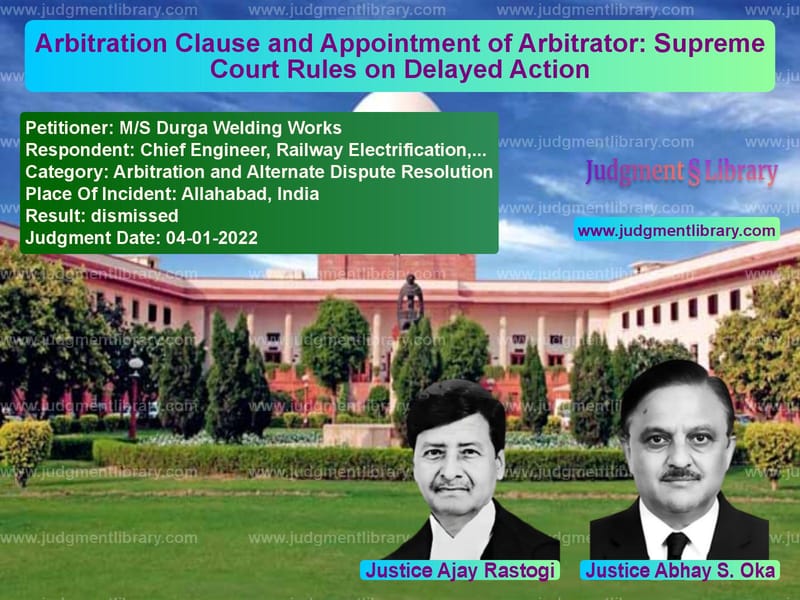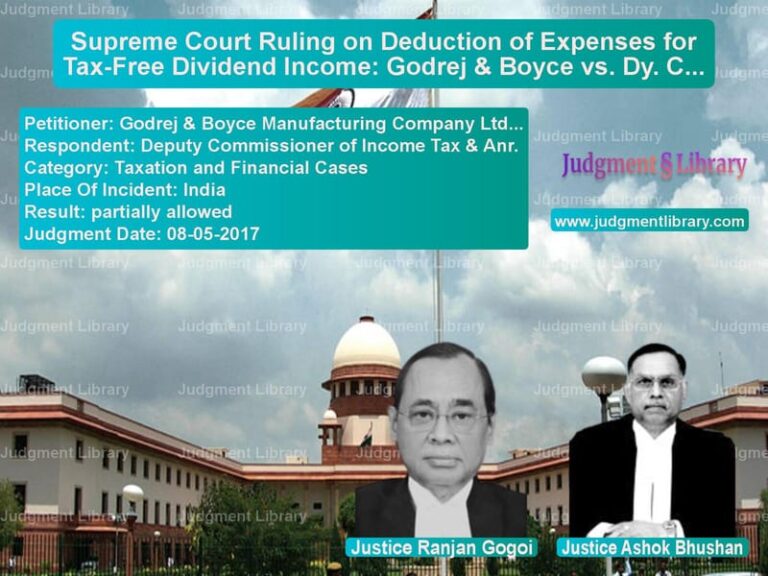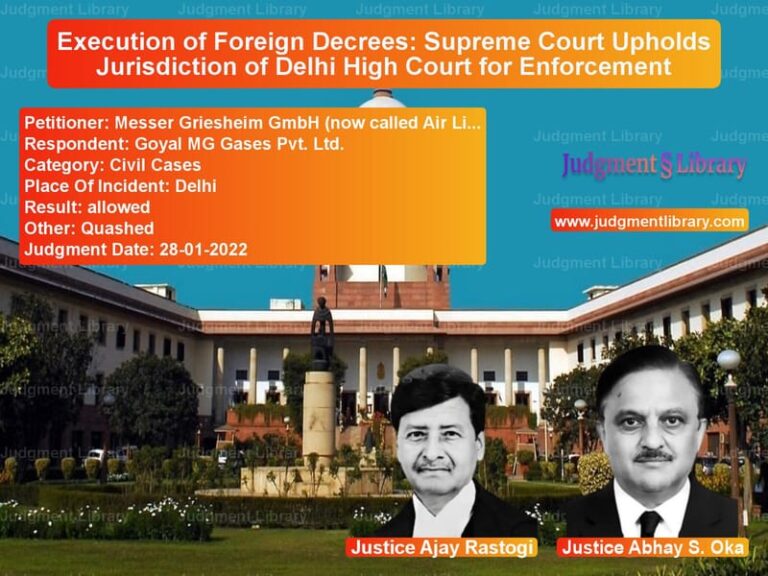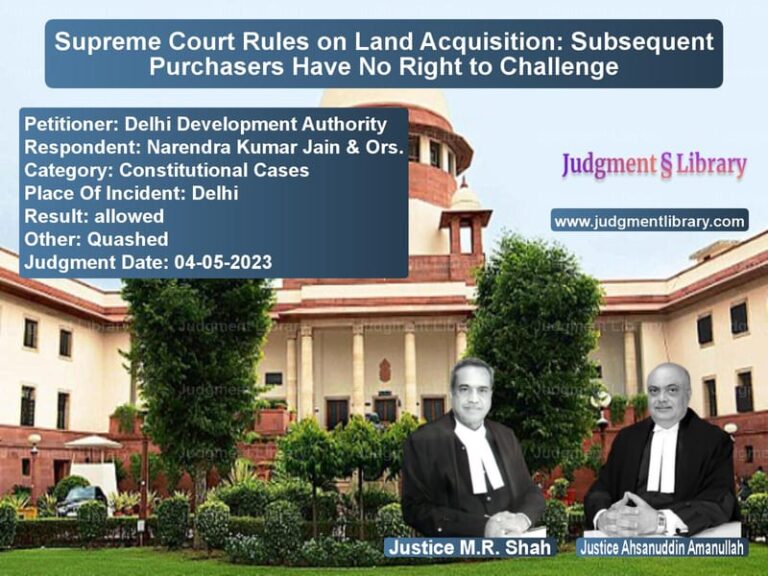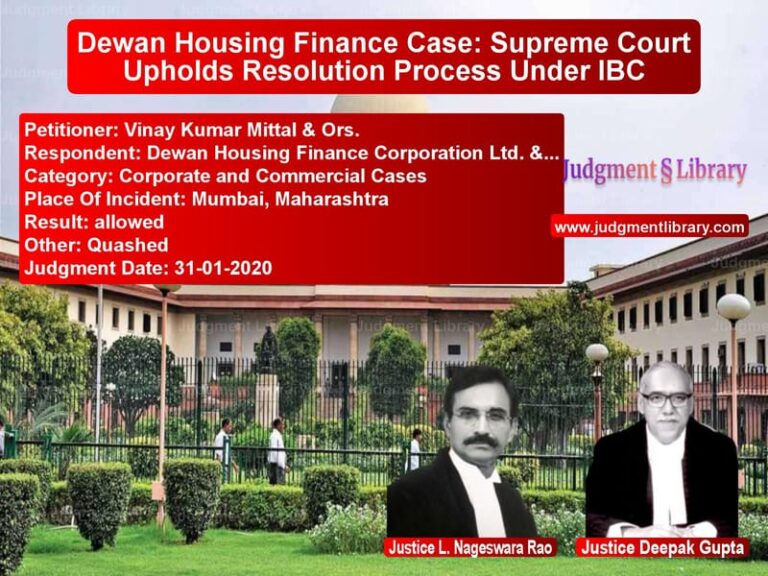Arbitration Clause and Appointment of Arbitrator: Supreme Court Rules on Delayed Action
The case of M/S Durga Welding Works v. Chief Engineer, Railway Electrification, Allahabad & Anr. revolves around a contractual dispute regarding the appointment of an arbitrator under Section 11(6) of the Arbitration and Conciliation Act, 1996. The Supreme Court had to determine whether the High Court erred in rejecting the appellant’s request for an arbitrator due to excessive delay in pursuing arbitration proceedings.
Background of the Case
The appellant, M/S Durga Welding Works, was awarded a tender by the Railway Electrification Department in 2006. The agreement included arbitration clauses (Clauses 63 and 64) for resolving disputes. When disputes arose over payments, the appellant served a legal notice on August 3, 2009, requesting the appointment of an arbitrator. However, the respondents failed to act promptly.
On October 23, 2009, the appellant filed an arbitration petition before the Orissa High Court under Section 11(6) of the Arbitration Act. However, the appellant took no further steps to serve notice or follow up on the petition. In the meantime, the respondents, through a letter dated January 28, 2010, requested the appellant to select two arbitrators from a panel of four. The appellant responded on August 28, 2010, selecting two names, and the respondents appointed an Arbitration Tribunal on September 24, 2010.
The appellant participated in the arbitration initially but later raised objections, claiming that the Arbitration Tribunal was not valid as it was constituted after the arbitration petition had been filed. The appellant subsequently refused to participate in the proceedings, leading to an ex parte arbitral award on June 21, 2013. It was only in 2016—three years after the ex parte award—that the appellant sought to revive its arbitration petition.
Arguments of the Petitioner (M/S Durga Welding Works)
- The respondents forfeited their right to appoint an arbitrator once the arbitration petition was filed on October 23, 2009.
- The appointment of arbitrators by the respondents on September 24, 2010 was invalid as the power had shifted to the court.
- The appellant should be granted a fresh arbitration process since the tribunal was improperly constituted.
- The High Court erred in dismissing the arbitration petition in 2019 instead of appointing an arbitrator.
Arguments of the Respondent (Railway Electrification Department)
- The appellant failed to act on the arbitration petition after filing it in 2009, and the respondents were never served any notice.
- The appellant voluntarily participated in the arbitral proceedings, submitted claims, and only objected when the award went against them.
- The arbitration was conducted as per the contract, and the appellant’s objections were belated and afterthoughts.
- The High Court rightly dismissed the petition, allowing the appellant to challenge the award under Section 34 or 37 of the Arbitration Act.
Key Observations of the Supreme Court
1. Impact of Delayed Action
The Court noted that the appellant did not take proactive steps to pursue the arbitration petition after filing it:
“Once an arbitration petition is filed, the applicant must ensure that due process is followed, including serving notice to the respondents. Failure to act for years cannot be ignored.”
2. Waiver of Objection by Participation
The Court observed that the appellant initially accepted the arbitration process, selected arbitrators, and submitted claims before later objecting:
“A party that willingly participates in arbitration, only to object when an award is passed against them, cannot be allowed to invalidate the entire process.”
3. Jurisdiction of the High Court
The Court upheld the High Court’s decision to reject the arbitration petition, stating:
“Where an arbitral tribunal has already been constituted and the process has concluded, an application under Section 11(6) is infructuous.”
4. Right to Challenge Under Section 34
The Court clarified that the proper remedy for the appellant was to challenge the arbitral award under Section 34 or Section 37 of the Arbitration Act, instead of seeking fresh arbitration:
“The correct legal course for the appellant is to file objections against the award rather than seek appointment of an arbitrator afresh.”
Final Judgment
The Supreme Court upheld the High Court’s decision and dismissed the appeal. The key takeaways are:
- The appellant’s arbitration petition was dismissed due to excessive delay and lack of action.
- The appellant forfeited its right to object to the Arbitration Tribunal by initially participating in the proceedings.
- The Arbitration Tribunal was validly constituted, and the proper remedy was to challenge the award, not seek fresh arbitration.
- The case reinforces that delayed objections to arbitration proceedings will not be entertained by courts.
This ruling emphasizes the importance of timely action in arbitration matters and discourages attempts to invalidate arbitration after voluntarily participating in proceedings.
Petitioner Name: M/S Durga Welding Works.Respondent Name: Chief Engineer, Railway Electrification, Allahabad & Anr..Judgment By: Justice Ajay Rastogi, Justice Abhay S. Oka.Place Of Incident: Allahabad, India.Judgment Date: 04-01-2022.
Don’t miss out on the full details! Download the complete judgment in PDF format below and gain valuable insights instantly!
Download Judgment: ms-durga-welding-wo-vs-chief-engineer,-rail-supreme-court-of-india-judgment-dated-04-01-2022.pdf
Directly Download Judgment: Directly download this Judgment
See all petitions in Arbitration Awards
See all petitions in Dispute Resolution Mechanisms
See all petitions in Arbitration Act
See all petitions in Enforcement of Awards
See all petitions in Judgment by Ajay Rastogi
See all petitions in Judgment by Abhay S. Oka
See all petitions in dismissed
See all petitions in supreme court of India judgments January 2022
See all petitions in 2022 judgments
See all posts in Arbitration and Alternate Dispute Resolution Category
See all allowed petitions in Arbitration and Alternate Dispute Resolution Category
See all Dismissed petitions in Arbitration and Alternate Dispute Resolution Category
See all partially allowed petitions in Arbitration and Alternate Dispute Resolution Category

